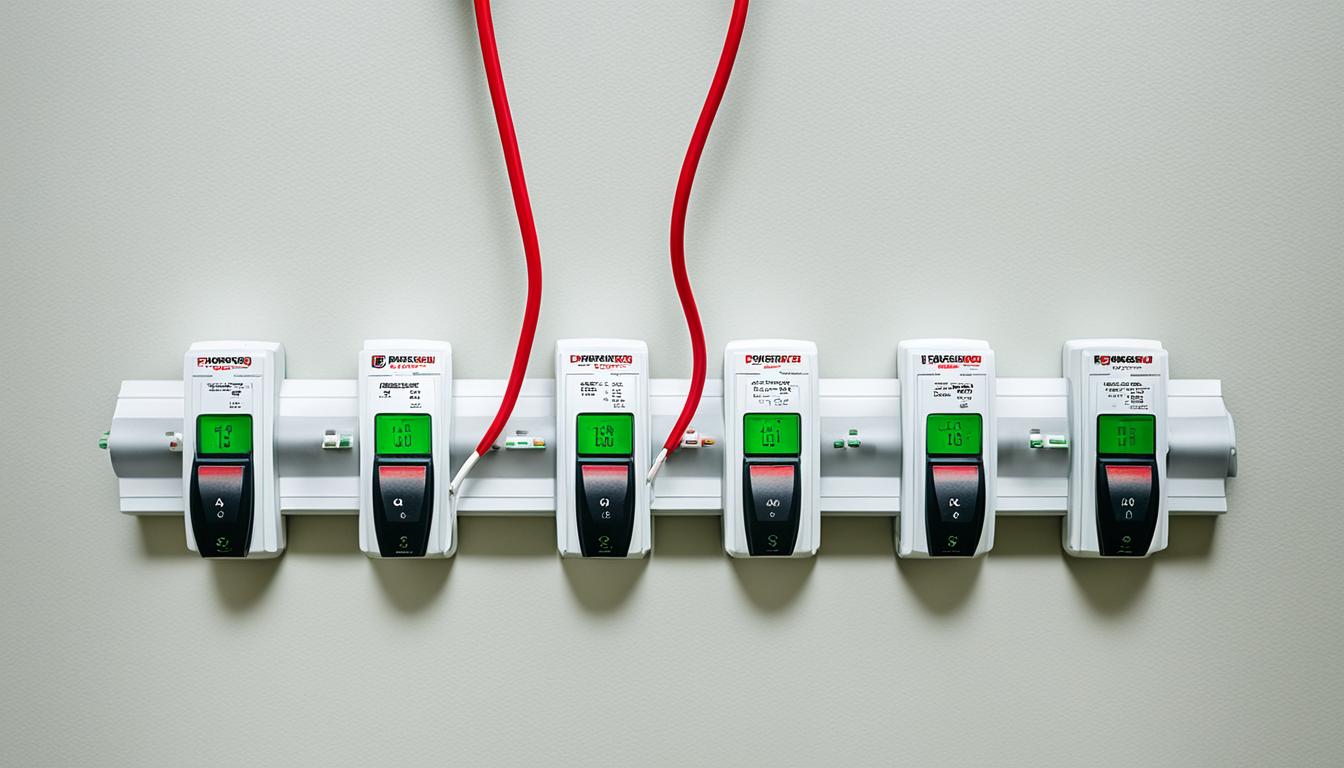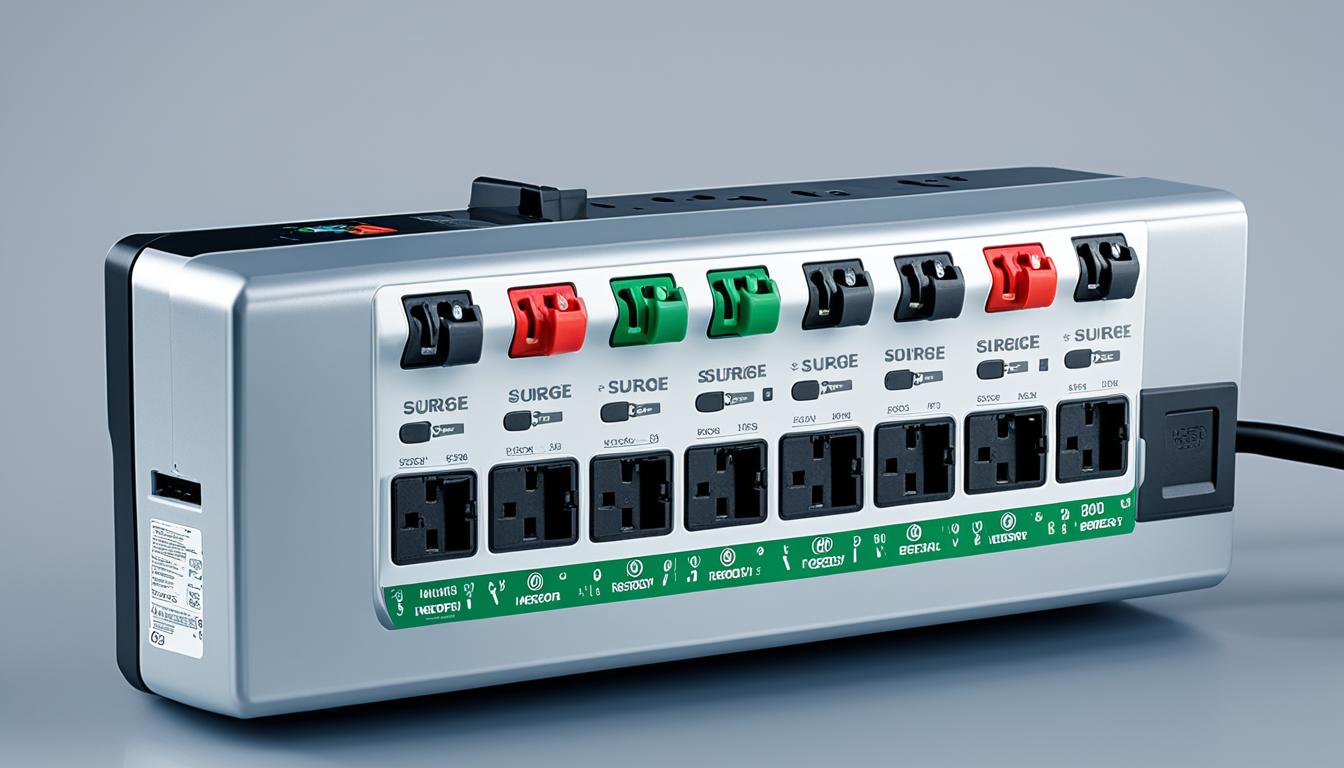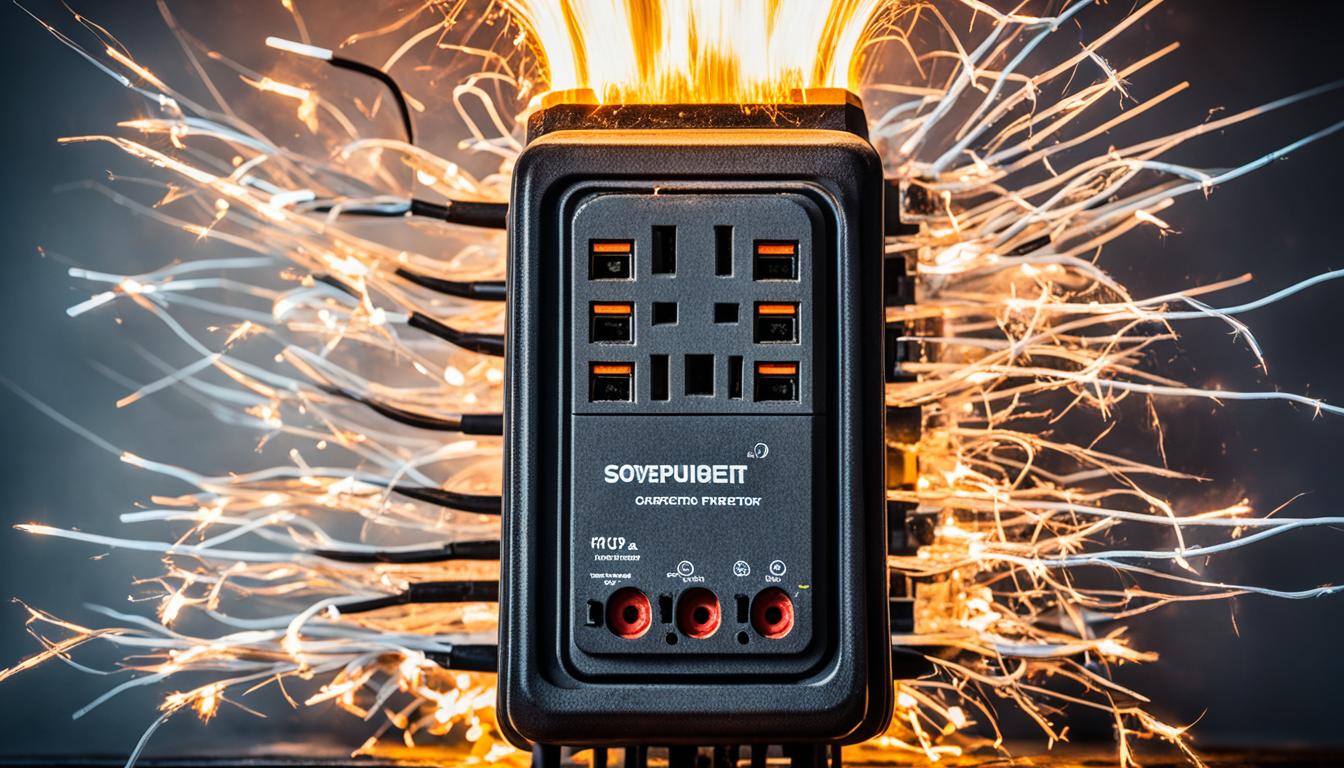Using an extension cord to power your air conditioner can be a convenient solution when the unit’s cord doesn’t reach the nearest outlet. However, it’s important to choose the right extension cord to ensure safe and effective operation. When it comes to air conditioner extension cords, there are several factors to consider.
First and foremost, opt for a heavy-duty extension cord specifically designed for air conditioners. These cords are built to handle the power demands of air conditioning units and ensure safe operation. Look for cords with a gauge of 14, which is suitable for most air conditioners, and a 15 amp rating to match the power requirements of your unit.
Another important consideration is the length of the extension cord. It’s best to keep the cord as short as possible to minimize resistance and prevent hazards such as electrocution and fires. Additionally, regularly inspect the extension cord for any damage and ensure it is visible and secure, avoiding hiding it under furniture or rugs.
When plugging in your extension cord, it’s recommended to directly connect it to a wall outlet rather than using additional cords or power strips. This helps reduce resistance and maintain proper voltage for your air conditioner.
While using an extension cord with your air conditioner is a viable option, it’s always worth exploring alternatives like installing new outlets or utilizing portable cooling units. Consulting professionals can provide expert advice and ensure the safety and efficiency of your cooling system.
Key Takeaways:
- Choose a heavy-duty extension cord specifically designed for air conditioners, with a gauge of 14 and a 15 amp rating.
- Keep the extension cord as short as possible to minimize resistance and prevent hazards.
- Regularly inspect the extension cord for damage and ensure it is visible and secure.
- Plug the extension cord directly into a wall outlet, avoiding additional cords or power strips.
- Consider alternatives to using an extension cord, such as installing new outlets or utilizing portable cooling units.
The Importance of Choosing the Right Extension Cord
When it comes to powering your air conditioner, selecting the right extension cord is of utmost importance for safety and efficiency. Using a heavy-duty extension cord specifically designed for air conditioners can ensure the smooth operation of your AC unit without risking electrical hazards or damage to the equipment.
One key factor to consider is the wire gauge of the extension cord. It is recommended to choose a 14 gauge extension cord for air conditioners, as it is designed to handle the high power requirements of these units. This heavy-duty cord can effectively transfer electricity without overheating or overworking the motor.
Another crucial consideration is the amp rating of the extension cord. Look for a cord with a 15 amp rating, as this matches the power needs of most air conditioners. Using a cord that is not suitable for heavy loads can increase the risk of fires and damage to your AC unit.
Additionally, cord length plays a role in ensuring safe operation. It is always best to choose the shortest extension cord possible to minimize resistance and prevent hazards. By reducing the length of the cord, you can minimize the strain on your AC unit and optimize its performance.
Remember, using the right extension cord is vital for maintaining the safety and efficiency of your air conditioner. By selecting a heavy-duty cord with the appropriate wire gauge, amp rating, and length, you can ensure the reliable operation of your AC unit.
Choose the right extension cord for safe and efficient operation of your air conditioner.
Understanding Power Efficiency and Amp Ratings
When choosing the right extension cord for your air conditioner, it’s crucial to consider the power efficiency and amp ratings of your AC unit. Power efficiency refers to the percentage of power input that transfers to the AC unit’s output. To minimize power loss during operation, it’s recommended to select an extension cord that matches your unit’s power efficiency.
If the power efficiency is not specified in your owner’s manual, you can determine your unit’s power needs by focusing on the amp rating. Simply divide the wattage by the expressed voltage to calculate the amperage required by your AC unit.
To prevent overloading and circuit breaker trips, ensure that the amp ratings of both the extension cord and the circuits being used are matched. Generally, a 14 gauge extension cord with a 15 amp rating is suitable for most air conditioning units. However, it’s always important to consult the manufacturer’s guidelines for any specific requirements.
Here’s an example of how power efficiency and amp ratings can impact your choice of extension cord:
| AC Unit | Power Efficiency | Amp Rating |
|---|---|---|
| Model A | 90% | 12.5 amps |
| Model B | 95% | 13.2 amps |
| Model C | 85% | 14 amps |
By understanding power efficiency and amp ratings, you can choose an extension cord that matches the requirements of your AC unit, ensuring safe and efficient operation.
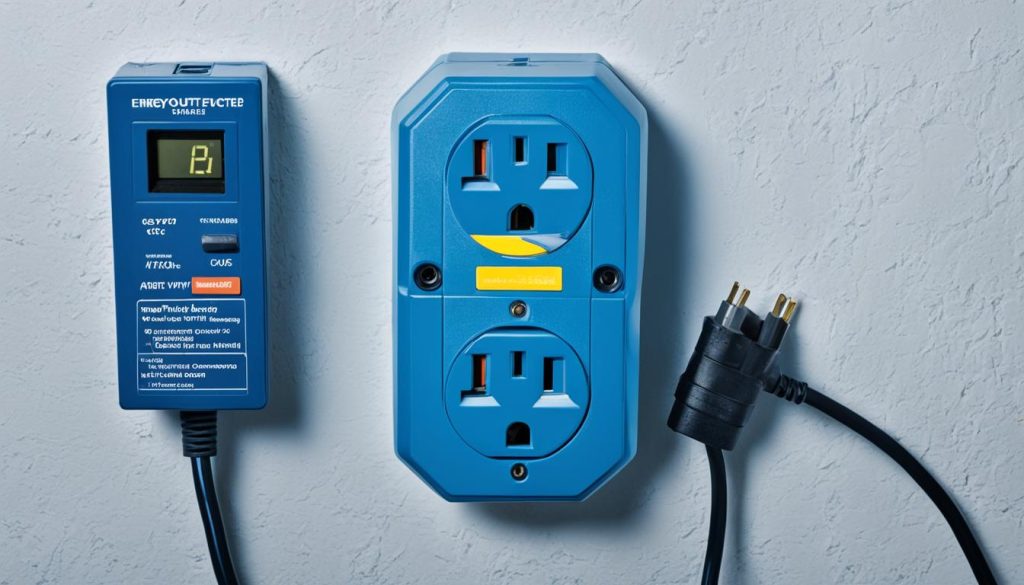
Considering Wire Gauge and Cord Length
When selecting an extension cord for your air conditioner, two important factors to consider are the wire gauge and cord length. The wire gauge determines the amount of electricity the cord can safely transfer, while the cord length affects the overall efficiency and safety of operation.
Wire Gauge:
The wire gauge of an extension cord is crucial because it determines the cord’s ability to handle the electrical load required by your air conditioner. As a general rule, it is recommended to choose an extension cord with a gauge that is at least the same as the gauge of your air conditioner’s power cord. For most air conditioning units, a 14 gauge extension cord is suitable.
Cord Length:
The length of the extension cord is an important consideration to prevent hazards and ensure efficient operation. Shorter cords minimize resistance, reducing strain on the air conditioner and promoting optimal performance. On the other hand, longer cords can increase resistance, potentially overworking the unit and leading to higher power consumption.
To determine the ideal cord length, it is recommended to choose the shortest extension cord that can reach the nearest power outlet. However, if a longer cord is necessary due to the distance, consider increasing the cord’s gauge to accommodate the resistance. Be sure to refer to the manufacturer’s guidelines for any specific requirements based on your air conditioner’s size.
| Gauge | Max Amp Capacity (for 120V) | Max Cord Length |
|---|---|---|
| 14 | 15 Amps | 50 feet |
| 12 | 20 Amps | 100 feet |
| 10 | 30 Amps | 200 feet |
Refer to the table above for a general guideline on the maximum amp capacity and cord length for different wire gauges. However, it is essential to consult the manufacturer’s guidelines specific to your air conditioner model to ensure you’re following the correct recommendations.
By considering both the wire gauge and cord length, you can ensure your air conditioner operates safely and efficiently, providing you with the cooling comfort you need during hot summer months.
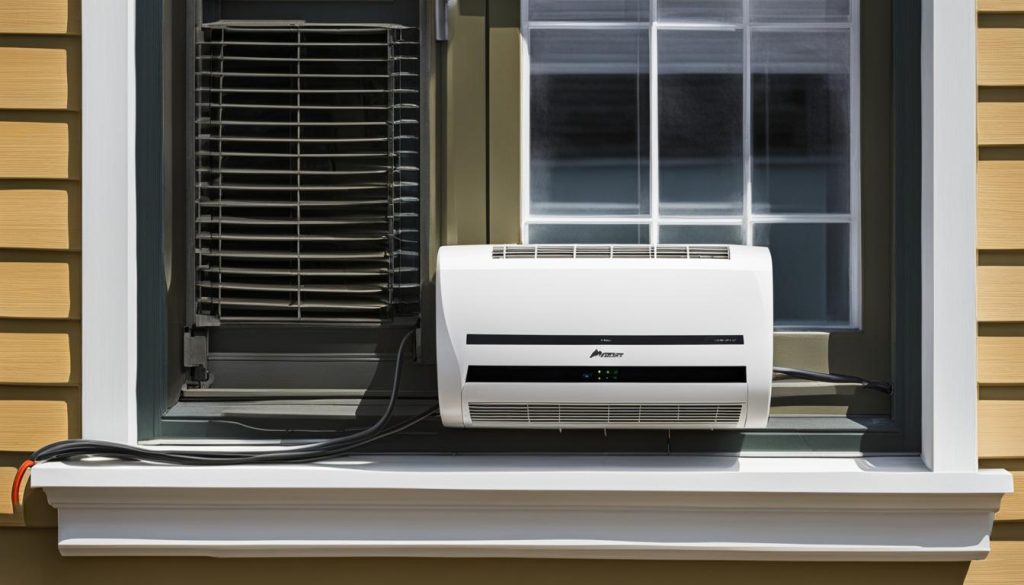
Importance of Three-Prong Plugs for Grounding
When it comes to air conditioner extension cords, three-prong plugs play a crucial role in ensuring safety and protection. These plugs provide an important grounding point that redirects excess electricity to the ground, preventing the risk of electrocution, AC unit damage, and electrical fires.
Unlike two-prong plugs, which lack this safety measure, three-prong plugs offer an essential layer of protection, especially during AC unit malfunctions or power surges. By using an extension cord with a plug that has three prongs, you can significantly reduce the risk of electrical hazards and ensure the safe operation of your AC unit.
When selecting an extension cord for your air conditioner, be sure to choose one with a three-prong plug to protect your home and your loved ones. By prioritizing safety, you can enjoy the cool comfort of your AC unit without worrying about potential electrical dangers.
Alternatives to Using an Extension Cord with an AC Unit
While using an extension cord with your air conditioner is possible, it is generally recommended to explore other alternatives for optimal safety and performance. One option is to replace the original power cord with a longer one, specifically designed for air conditioners. This non-invasive solution allows for convenient and safe operation of your AC unit without the need for an extension cord.
Another alternative is to have new electrical outlets installed closer to your air conditioner. By eliminating the need for an extension cord altogether, you can ensure a safer and more reliable power source for your unit. Professional electricians can assess your home’s electrical system and install outlets in strategic locations, making it more convenient to power your AC unit without the use of an extension cord.
Consider portable AC units as another viable alternative. These units provide the flexibility to cool specific rooms without the need for any additional equipment or installation. Portable AC units are especially useful in spaces where installing a traditional wall-mounted unit or central air conditioning system may not be practical or cost-effective. With a portable unit, you can enjoy the comfort of cool air without the hassle of extension cords.
When considering alternatives to using an extension cord with your AC unit, it is important to consult professionals for expert advice and installation. They can help you determine the best solution based on your specific needs and ensure optimal performance and safety in cooling your home during hot summers.
FAQ
What type of extension cord should I use for my air conditioner?
It is important to choose a heavy-duty extension cord specifically designed for air conditioners. Look for features such as a 14 gauge wire and a 15 amp rating.
How do I determine the power efficiency and amp ratings for my AC unit?
Check the owner’s manual for the power efficiency rating. If not specified, use the amp rating to determine the unit’s power needs. Divide the wattage by the voltage to calculate the amperage required.
What wire gauge and cord length should I choose for my extension cord?
A 14 gauge extension cord is suitable for most air conditioning units. However, be sure to check the manufacturer’s guidelines for any specific gauge requirements based on the unit’s size. Choose the shortest cord length possible to minimize resistance and prevent hazards.
Why is it important to use a three-prong plug for grounding?
Three-prong plugs provide a grounding point, allowing excess electricity to safely redirect to the ground during malfunctions or power surges. This reduces the risk of electrocution, AC unit damage, and electrical fires.
Can I use an extension cord with my AC unit?
While it is possible to use an extension cord, it is generally recommended to explore other alternatives, such as replacing the power cord or installing new outlets closer to the unit. Portable AC units can also be considered. Consult with professionals for expert advice.
